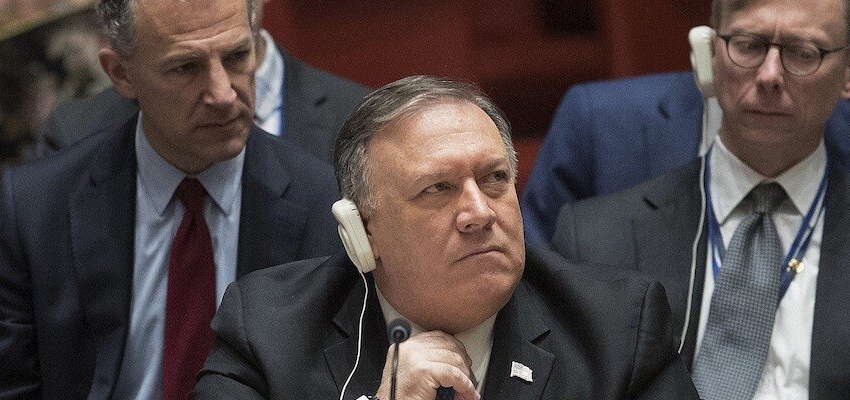On a day when the European Union pointedly excluded the United States from a �safe list� of countries permitted to travel to the 27-member bloc, the council�s chilly reception of Pompeo added to a portrait of an increasingly isolated United States and underscored how little deference other countries pay the Trump administration as it faces a grim reelection contest. The U.N. debate came amid a sharpening blowback in Washington to revelations that the Trump administration failed to act on months of intelligence warnings that Russia offered Taliban fighters bounties to kill U.S. and coalition troops in Afghanistan.
The dispute centered on the fate of the nearly moribund 2015 Iran nuclear deal, which capped Iran�s ability to develop a nuclear weapon but which the United States abandoned in May 2018. European parties to the deal, like Iran, want to keep it alive; the Trump administration wants to kill it before the election, lest any future Democratic administration bring it back to life.
The latest battleground is one provision of that deal, the planned expiry in October of a U.N. arms embargo on Iran�one of the sweeteners of the nuclear deal. U.S. allies, including the security council�s five European states, share Washington�s concern about Iran�s arms trade, though Europe�s own arms embargo is set to continue until 2023 regardless. But they worry that extending the U.N. arms embargo, in clear violation of the pact signed in 2015, would drive Tehran to kick out nuclear inspectors and set the stage for an even quicker development of its nuclear program.
�The [Iran nuclear pact], which is the result of compromise, can of course be seen as an instrument that can be improved,� France�s U.N. ambassador, Nicolas de Rivi�re, told the council. �There is as yet no serious alternative to prevent Iran from acquiring nuclear weapons, and its disappearance would improve neither the regional situation nor the security of our populations.�
Since President Donald Trump pulled the United States out of the deal, Iran has violated key tenets of the accord by increasing its stockpiles of nuclear fuel and resuming its enrichment of uranium, according to assessments from the International Atomic Energy Agency.
At the opening of Tuesday�s virtual session, Rosemary DiCarlo, a former U.S. State Department official who serves as U.N. undersecretary-general for political affairs, praised the nuclear pact as a �significant achievement of multilateral diplomacy and dialogue� and expressed �regret� over the U.S. decision to withdraw, noting that Iran was in compliance with the pact before Trump�s abrupt decision to pull the plug.
But she also expressed regret that since July 2019 Iran has violated key provisions of the nuclear pact, surpassing limits on the size of its stockpiles of heavy water and low-enriched uranium and engaging in prohibited nuclear research and development activities.
DiCarlo also flagged Iran�s role in missile and drone attacks against Saudi Arabia, as well as arms shipments to proxies in Yemen that appear to run afoul of the provisions of the key U.N. Security Council resolution that endorsed the nuclear deal.
Iranian Foreign Minister Mohammad Javad Zarif dismissed claims that Iranian-made weapons were being transferred to Yemen and elsewhere in violation of U.N. sanctions.
But the draft has little support among major powers at the U.N., reflecting Washington�s isolation on its Iran policy.
�The international community in general and the U.N. Security Council in particular are facing an important decision,� Zarif told the council. �Do we maintain respect of the rule of law, or do we return to the law of the jungle by surrendering to the whims of an outlaw bully?�
The Trump administration this month circulated a draft resolution to extend the arms embargo on Iran, but veto-wielding China and Russia signaled they would not support the U.S. plan. European powers also reacted coolly to the resolution and are expected to introduce their own stopgap proposal to extend parts of the arms embargo for up to six months. It is unclear if the United States would support their plan.
The Trump administration has charged Tehran with playing a destabilizing role in the Middle East through its support of proxy terrorist groups in the region. Pompeo said that if the United Nations did not extend the arms embargo, it would pave the way for Iran to procure advanced military hardware from Russia and China that would undercut regional stability and potentially threaten capitals in Europe and even South Asia�reiterating misleading claims he made last week about the operational range of high-end Russian and Chinese fighters.
�If you fail to act, Iran will be free to purchase Russian-made fighter jets that can strike up to a 3,000-kilometer radius, putting cities like Riyadh, New Delhi, Rome, and Warsaw in Iranian crosshairs,� Pompeo told the council during Tuesday�s virtual meeting.
�Don�t just take it from the United States; listen to countries in the region. From Israel to the Gulf, countries in the Middle East�who are most exposed to Iran�s predations�are speaking with one voice: Extend the arms embargo,� he said.
# Tags











